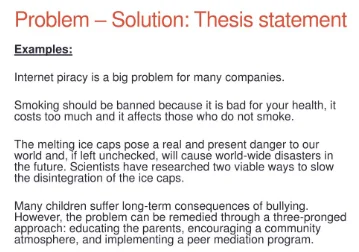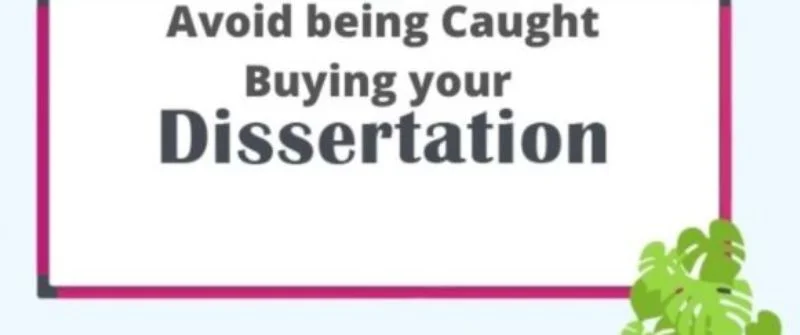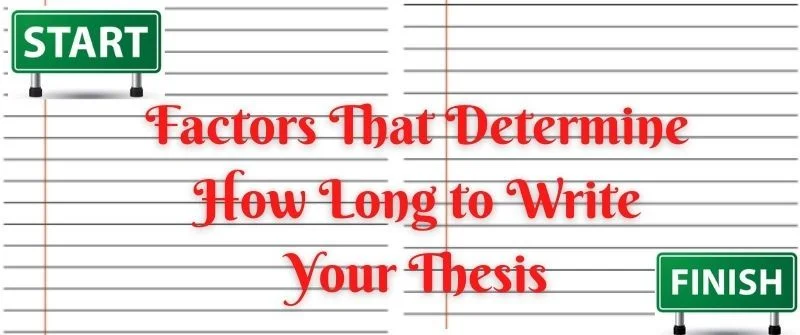- Have your assignments done by seasoned writers. We work 24/7. Just email us at:
- [email protected]


9 Different Types of Thesis Statements: With Examples for Each

Types of Thesis Statements
A strong thesis statement is a fundamental part of a well-structured argumentative essay or academic paper. It holds various important purposes.
Some of the purposes of a thesis statement include making the paper’s focus clear, guiding the writer, organizing the essay’s structure, enhancing clarity and understanding, and engaging the readers.
It also helps the writer engage in critical thinking, enhances the strength of the essay’s argument, and improves consistency. A thesis statement is usually part of the evaluative criterion.

The thing that differentiates a thesis statement from another is its particular characteristics and purpose. Different papers or essays require different types of thesis statements.
This article will discuss the different types of thesis statements in terms of their definition and explanation, provide examples for those statements, and demonstrate when to use them.
Different Types of Thesis Statements
1. the expository thesis statement.

This is a type of thesis statement used in research papers or expository essays. It is a clear and concise statement of the central argument or point of the essay.
The expository thesis statement is meant to explain, inform, or describe the topic that is being discussed.
It is neutral because its aim is not to persuade readers to adopt a particular perspective. It straightforwardly presents objective information and facts.
One example of an expository thesis statement includes: “The principles of Newton’s laws of motion lay the foundation for understanding the fundamental behavior of objects in the physical world.”
Another example is: “The process of photosynthesis, in which plants convert sunlight into energy, is a crucial part of the ecosystem’s energy cycle.”
Expository thesis statements can be used in situations where the aim is to explain a concept, provide information, describe a process, or present objective facts without trying to persuade the audience.
As such, expository thesis statements can be used in informative essays, expository research papers, how-to guides, and descriptive essays.
2. The Argumentative Thesis Statement
This is a thesis statement used in persuasive or argumentative essays . It presents assertive, clear, and debatable claims that the author or writer wishes to support using logical reasoning and evidence within the essay.
The argumentative thesis statement takes a stance on a particular viewpoint to persuade the reader to concur with that point of view.
An example of the argumentative thesis statement includes: “The government should implement stricter gun control laws to reduce the incidence of gun violence in the United States.”
Another good example is: “Social media has a detrimental impact on mental health, as it promotes unrealistic standards and encourages constant comparison with others.”
As aforementioned, argumentative thesis statements are meant to convince, persuade, or argue for a specific viewpoint or position on a debatable or controversial issue.
Therefore, argumentative thesis statements can be used in persuasive essays, discussions and debates, controversial topics, and opinion editorials.
3. The Analytical Thesis Statement

These are thesis statements used in research papers or analytical essays. They focus on breaking down and examining complex issues or topics into their basic parts and evaluating how they relate to each other.
The main purpose of an analytical thesis statement is to give insight, understanding, and interpretation instead of informing or persuading the audience.
One example of an analytical thesis statement is: “The economic crisis of 2008 can be attributed to a combination of factors, including risky financial practices, regulatory failures, and the burst of the housing bubble.”
The second example is: “In Shakespeare’s play ‘Hamlet,’ the character of Hamlet undergoes a profound transformation from a hesitant and indecisive prince to a vengeful and resolute avenger.”
The analytical thesis statement is used when the objective is to interpret, evaluate, or dissect a text, subject, or idea in a critical and detailed manner.
Such statements can be used in literary analysis essays, critical essays, research papers, comparative essays, and interdisciplinary studies.
4. The Comparative Thesis Statement
This is a thesis statement used in research papers or essays that are meant to compare and contrast two or more ideas, subjects, texts, or phenomena.
A comparative thesis statement highlights the similarities and differences among the things or subjects that are being compared.
They give a debatable, focused, and clear claim meant to be the foundation for comparative analysis.
The first example of such a comparative thesis statement is: “A comparison of Eastern and Western philosophies reveals fundamental differences in their views on the self, the nature of reality, and the path to enlightenment.”
The second example is : “When assessing the impact of two different economic policies, a comparison of austerity measures and stimulus spending reveals varying effects on economic growth and unemployment rates.”
Such statements are used in comparative essays, literacy and textual analysis, cultural and historical studies, argumentative essays, and academic research.
5. The Narrative Thesis Statement
The narrative thesis statement is used in storytelling contexts or narrative essays. It provides the main theme, point, or message the writer or narrator wants to convey.

It is focused on the purpose of the narrative in that it encapsulates the main lesson, idea, or experience the writer or narrator wishes to convey.
An example of the narrative thesis statement is: “The story of my grandmother’s life in war-torn Vietnam reflects the strength and determination that can emerge from adversity.”
Another example includes: “In the narrative of my childhood summers spent at the family cabin, I discovered the importance of cherishing simple moments with loved ones.”
Such thesis statements can be used in narrative essays, memoirs, personal reflections, oral storytelling, and creative writing.
6. The Persuasive Thesis Statement
This is a thesis statement used in speeches, argumentative essays, and persuasive essays. Its main purpose is to give a clear and debatable claim which the writer intends to support, argue, and persuade the audience to accept.
Persuasive thesis statements take a clear position concerning a controversial topic or issue and aim to convince the readers of the validity of that stance.
An example of such a thesis statement is: “The death penalty should be abolished because it is inherently inhumane, prone to error, and does not act as a deterrent to crime.”
Another example is: “Public schools should implement comprehensive sex education programs to reduce teen pregnancy rates and promote responsible sexual behavior.”
Persuasive thesis statements can be used in argumentative essays, persuasive essays, speeches and debates, op-eds and editorials, and policy proposals.
7. The Descriptive Thesis Statement
The descriptive thesis statement aims to paint a clear or vivid picture of an object, subject, experience, or place.
It focuses on clearly describing the topic or conveying a specific feeling or impression about the topic. It helps the reader know what to expect when it comes to imagery, emotions, or sensory details in the essay.
An example of a descriptive thesis statement is: “ The bustling, vibrant market in Marrakech, with its vibrant colors, exotic spices, and the hum of haggling, immerses visitors in the rich tapestry of Moroccan culture.”
Another example includes: “The abandoned, dilapidated house at the end of the street, with broken windows and overgrown ivy, exudes an eerie and haunted aura.”
Such statements can be used in travel writing, descriptive essays, creative writing, art and film analysis, and immersive storytelling.
8. The Problem-Solution Thesis Statement
This is a thesis statement primarily used in reports, essays, or papers meant to address a particular problem or issue and propose the course of action or solution to resolve the issue.

The problem-solution thesis statement’s purpose is to recognize a significant issue and present an actionable and clear plan or solution to address it.
An example of such a thesis statement is: “The rising levels of air pollution in major cities can be mitigated by implementing stricter emission standards for vehicles and promoting the use of public transportation.”
Another example includes: “To combat the obesity epidemic among children, schools should incorporate healthier meal options, increase physical education requirements, and promote nutritional education.”
The thesis statement can be used in policy proposals, business reports, problem-solving essays, community action plans, and scientific research.
9. The Cause and Effect Thesis Statement
Finally, the cause-and-effect thesis statement is meant to explore and explain the connections between phenomena, actions, or events by recognizing the causes and their effects.
Such thesis statements establish particular causal relationships by explaining how one action or event leads to another, and the reasons their connections are important.
One example of a cause-and-effect thesis statement is: “The excessive use of social media among teenagers can lead to increased feelings of loneliness and anxiety, as it hinders face-to-face social interactions and promotes social comparison.”
Another example includes: “The decline of bee populations, caused by pesticide use and habitat destruction, has a cascading effect on food production and biodiversity, endangering global ecosystems.”
The thesis statement can be used in scientific research, cause and effect essays, historical analysis, environmental studies, and social and economic studies.
A strong thesis statement is a very important part of a well-structured argumentative essay or academic paper.
What differentiates a thesis statement from another is its particular characteristics and purpose. Different papers or essays require different types of thesis statements.
Therefore, it is essential to first identify the type of paper or essay before deciding on the thesis statement to use.

Josh Jasen or JJ as we fondly call him, is a senior academic editor at Grade Bees in charge of the writing department. When not managing complex essays and academic writing tasks, Josh is busy advising students on how to pass assignments. In his spare time, he loves playing football or walking with his dog around the park.
Related posts

caught buying dissertations
Avoid being Caught Buying Dissertations: Tips to Do it Right

Do Dissertation writing services work
Do Dissertation Writing services work? Is hiring someone Legal

Time needed to write your thesis
Time to Write a Thesis or Dissertation: Tips to Finish Fast
25 Thesis Statement Examples

Chris Drew (PhD)
Dr. Chris Drew is the founder of the Helpful Professor. He holds a PhD in education and has published over 20 articles in scholarly journals. He is the former editor of the Journal of Learning Development in Higher Education. [Image Descriptor: Photo of Chris]
Learn about our Editorial Process

A thesis statement is needed in an essay or dissertation . There are multiple types of thesis statements – but generally we can divide them into expository and argumentative. An expository statement is a statement of fact (common in expository essays and process essays) while an argumentative statement is a statement of opinion (common in argumentative essays and dissertations). Below are examples of each.
Strong Thesis Statement Examples

1. School Uniforms
“Mandatory school uniforms should be implemented in educational institutions as they promote a sense of equality, reduce distractions, and foster a focused and professional learning environment.”
Best For: Argumentative Essay or Debate
Read More: School Uniforms Pros and Cons

2. Nature vs Nurture
“This essay will explore how both genetic inheritance and environmental factors equally contribute to shaping human behavior and personality.”
Best For: Compare and Contrast Essay
Read More: Nature vs Nurture Debate

3. American Dream
“The American Dream, a symbol of opportunity and success, is increasingly elusive in today’s socio-economic landscape, revealing deeper inequalities in society.”
Best For: Persuasive Essay
Read More: What is the American Dream?

4. Social Media
“Social media has revolutionized communication and societal interactions, but it also presents significant challenges related to privacy, mental health, and misinformation.”
Best For: Expository Essay
Read More: The Pros and Cons of Social Media

5. Globalization
“Globalization has created a world more interconnected than ever before, yet it also amplifies economic disparities and cultural homogenization.”
Read More: Globalization Pros and Cons

6. Urbanization
“Urbanization drives economic growth and social development, but it also poses unique challenges in sustainability and quality of life.”
Read More: Learn about Urbanization

7. Immigration
“Immigration enriches receiving countries culturally and economically, outweighing any perceived social or economic burdens.”
Read More: Immigration Pros and Cons

8. Cultural Identity
“In a globalized world, maintaining distinct cultural identities is crucial for preserving cultural diversity and fostering global understanding, despite the challenges of assimilation and homogenization.”
Best For: Argumentative Essay
Read More: Learn about Cultural Identity

9. Technology
“Medical technologies in care institutions in Toronto has increased subjcetive outcomes for patients with chronic pain.”
Best For: Research Paper

10. Capitalism vs Socialism
“The debate between capitalism and socialism centers on balancing economic freedom and inequality, each presenting distinct approaches to resource distribution and social welfare.”

11. Cultural Heritage
“The preservation of cultural heritage is essential, not only for cultural identity but also for educating future generations, outweighing the arguments for modernization and commercialization.”

12. Pseudoscience
“Pseudoscience, characterized by a lack of empirical support, continues to influence public perception and decision-making, often at the expense of scientific credibility.”
Read More: Examples of Pseudoscience

13. Free Will
“The concept of free will is largely an illusion, with human behavior and decisions predominantly determined by biological and environmental factors.”
Read More: Do we have Free Will?

14. Gender Roles
“Traditional gender roles are outdated and harmful, restricting individual freedoms and perpetuating gender inequalities in modern society.”
Read More: What are Traditional Gender Roles?

15. Work-Life Ballance
“The trend to online and distance work in the 2020s led to improved subjective feelings of work-life balance but simultaneously increased self-reported loneliness.”
Read More: Work-Life Balance Examples


16. Universal Healthcare
“Universal healthcare is a fundamental human right and the most effective system for ensuring health equity and societal well-being, outweighing concerns about government involvement and costs.”
Read More: The Pros and Cons of Universal Healthcare

17. Minimum Wage
“The implementation of a fair minimum wage is vital for reducing economic inequality, yet it is often contentious due to its potential impact on businesses and employment rates.”
Read More: The Pros and Cons of Raising the Minimum Wage

18. Homework
“The homework provided throughout this semester has enabled me to achieve greater self-reflection, identify gaps in my knowledge, and reinforce those gaps through spaced repetition.”
Best For: Reflective Essay
Read More: Reasons Homework Should be Banned

19. Charter Schools
“Charter schools offer alternatives to traditional public education, promising innovation and choice but also raising questions about accountability and educational equity.”
Read More: The Pros and Cons of Charter Schools

20. Effects of the Internet
“The Internet has drastically reshaped human communication, access to information, and societal dynamics, generally with a net positive effect on society.”
Read More: The Pros and Cons of the Internet

21. Affirmative Action
“Affirmative action is essential for rectifying historical injustices and achieving true meritocracy in education and employment, contrary to claims of reverse discrimination.”
Best For: Essay
Read More: Affirmative Action Pros and Cons

22. Soft Skills
“Soft skills, such as communication and empathy, are increasingly recognized as essential for success in the modern workforce, and therefore should be a strong focus at school and university level.”
Read More: Soft Skills Examples

23. Moral Panic
“Moral panic, often fueled by media and cultural anxieties, can lead to exaggerated societal responses that sometimes overlook rational analysis and evidence.”
Read More: Moral Panic Examples

24. Freedom of the Press
“Freedom of the press is critical for democracy and informed citizenship, yet it faces challenges from censorship, media bias, and the proliferation of misinformation.”
Read More: Freedom of the Press Examples

25. Mass Media
“Mass media shapes public opinion and cultural norms, but its concentration of ownership and commercial interests raise concerns about bias and the quality of information.”
Best For: Critical Analysis
Read More: Mass Media Examples
Checklist: How to use your Thesis Statement
✅ Position: If your statement is for an argumentative or persuasive essay, or a dissertation, ensure it takes a clear stance on the topic. ✅ Specificity: It addresses a specific aspect of the topic, providing focus for the essay. ✅ Conciseness: Typically, a thesis statement is one to two sentences long. It should be concise, clear, and easily identifiable. ✅ Direction: The thesis statement guides the direction of the essay, providing a roadmap for the argument, narrative, or explanation. ✅ Evidence-based: While the thesis statement itself doesn’t include evidence, it sets up an argument that can be supported with evidence in the body of the essay. ✅ Placement: Generally, the thesis statement is placed at the end of the introduction of an essay.
Try These AI Prompts – Thesis Statement Generator!
One way to brainstorm thesis statements is to get AI to brainstorm some for you! Try this AI prompt:
💡 AI PROMPT FOR EXPOSITORY THESIS STATEMENT I am writing an essay on [TOPIC] and these are the instructions my teacher gave me: [INSTUCTIONS]. I want you to create an expository thesis statement that doesn’t argue a position, but demonstrates depth of knowledge about the topic.
💡 AI PROMPT FOR ARGUMENTATIVE THESIS STATEMENT I am writing an essay on [TOPIC] and these are the instructions my teacher gave me: [INSTRUCTIONS]. I want you to create an argumentative thesis statement that clearly takes a position on this issue.
💡 AI PROMPT FOR COMPARE AND CONTRAST THESIS STATEMENT I am writing a compare and contrast essay that compares [Concept 1] and [Concept2]. Give me 5 potential single-sentence thesis statements that remain objective.

- Chris Drew (PhD) https://helpfulprofessor.com/author/chris-drew-phd-2/ 10 Reasons you’re Perpetually Single
- Chris Drew (PhD) https://helpfulprofessor.com/author/chris-drew-phd-2/ 20 Montessori Toddler Bedrooms (Design Inspiration)
- Chris Drew (PhD) https://helpfulprofessor.com/author/chris-drew-phd-2/ 21 Montessori Homeschool Setups
- Chris Drew (PhD) https://helpfulprofessor.com/author/chris-drew-phd-2/ 101 Hidden Talents Examples
Leave a Comment Cancel Reply
Your email address will not be published. Required fields are marked *
Purdue Online Writing Lab Purdue OWL® College of Liberal Arts
Tips and Examples for Writing Thesis Statements

Welcome to the Purdue OWL
This page is brought to you by the OWL at Purdue University. When printing this page, you must include the entire legal notice.
Copyright ©1995-2018 by The Writing Lab & The OWL at Purdue and Purdue University. All rights reserved. This material may not be published, reproduced, broadcast, rewritten, or redistributed without permission. Use of this site constitutes acceptance of our terms and conditions of fair use.
Tips for Writing Your Thesis Statement
1. Determine what kind of paper you are writing:
- An analytical paper breaks down an issue or an idea into its component parts, evaluates the issue or idea, and presents this breakdown and evaluation to the audience.
- An expository (explanatory) paper explains something to the audience.
- An argumentative paper makes a claim about a topic and justifies this claim with specific evidence. The claim could be an opinion, a policy proposal, an evaluation, a cause-and-effect statement, or an interpretation. The goal of the argumentative paper is to convince the audience that the claim is true based on the evidence provided.
If you are writing a text that does not fall under these three categories (e.g., a narrative), a thesis statement somewhere in the first paragraph could still be helpful to your reader.
2. Your thesis statement should be specific—it should cover only what you will discuss in your paper and should be supported with specific evidence.
3. The thesis statement usually appears at the end of the first paragraph of a paper.
4. Your topic may change as you write, so you may need to revise your thesis statement to reflect exactly what you have discussed in the paper.
Thesis Statement Examples
Example of an analytical thesis statement:
The paper that follows should:
- Explain the analysis of the college admission process
- Explain the challenge facing admissions counselors
Example of an expository (explanatory) thesis statement:
- Explain how students spend their time studying, attending class, and socializing with peers
Example of an argumentative thesis statement:
- Present an argument and give evidence to support the claim that students should pursue community projects before entering college

Thesis Statements
What this handout is about.
This handout describes what a thesis statement is, how thesis statements work in your writing, and how you can craft or refine one for your draft.
Introduction
Writing in college often takes the form of persuasion—convincing others that you have an interesting, logical point of view on the subject you are studying. Persuasion is a skill you practice regularly in your daily life. You persuade your roommate to clean up, your parents to let you borrow the car, your friend to vote for your favorite candidate or policy. In college, course assignments often ask you to make a persuasive case in writing. You are asked to convince your reader of your point of view. This form of persuasion, often called academic argument, follows a predictable pattern in writing. After a brief introduction of your topic, you state your point of view on the topic directly and often in one sentence. This sentence is the thesis statement, and it serves as a summary of the argument you’ll make in the rest of your paper.
What is a thesis statement?
A thesis statement:
- tells the reader how you will interpret the significance of the subject matter under discussion.
- is a road map for the paper; in other words, it tells the reader what to expect from the rest of the paper.
- directly answers the question asked of you. A thesis is an interpretation of a question or subject, not the subject itself. The subject, or topic, of an essay might be World War II or Moby Dick; a thesis must then offer a way to understand the war or the novel.
- makes a claim that others might dispute.
- is usually a single sentence near the beginning of your paper (most often, at the end of the first paragraph) that presents your argument to the reader. The rest of the paper, the body of the essay, gathers and organizes evidence that will persuade the reader of the logic of your interpretation.
If your assignment asks you to take a position or develop a claim about a subject, you may need to convey that position or claim in a thesis statement near the beginning of your draft. The assignment may not explicitly state that you need a thesis statement because your instructor may assume you will include one. When in doubt, ask your instructor if the assignment requires a thesis statement. When an assignment asks you to analyze, to interpret, to compare and contrast, to demonstrate cause and effect, or to take a stand on an issue, it is likely that you are being asked to develop a thesis and to support it persuasively. (Check out our handout on understanding assignments for more information.)
How do I create a thesis?
A thesis is the result of a lengthy thinking process. Formulating a thesis is not the first thing you do after reading an essay assignment. Before you develop an argument on any topic, you have to collect and organize evidence, look for possible relationships between known facts (such as surprising contrasts or similarities), and think about the significance of these relationships. Once you do this thinking, you will probably have a “working thesis” that presents a basic or main idea and an argument that you think you can support with evidence. Both the argument and your thesis are likely to need adjustment along the way.
Writers use all kinds of techniques to stimulate their thinking and to help them clarify relationships or comprehend the broader significance of a topic and arrive at a thesis statement. For more ideas on how to get started, see our handout on brainstorming .
How do I know if my thesis is strong?
If there’s time, run it by your instructor or make an appointment at the Writing Center to get some feedback. Even if you do not have time to get advice elsewhere, you can do some thesis evaluation of your own. When reviewing your first draft and its working thesis, ask yourself the following :
- Do I answer the question? Re-reading the question prompt after constructing a working thesis can help you fix an argument that misses the focus of the question. If the prompt isn’t phrased as a question, try to rephrase it. For example, “Discuss the effect of X on Y” can be rephrased as “What is the effect of X on Y?”
- Have I taken a position that others might challenge or oppose? If your thesis simply states facts that no one would, or even could, disagree with, it’s possible that you are simply providing a summary, rather than making an argument.
- Is my thesis statement specific enough? Thesis statements that are too vague often do not have a strong argument. If your thesis contains words like “good” or “successful,” see if you could be more specific: why is something “good”; what specifically makes something “successful”?
- Does my thesis pass the “So what?” test? If a reader’s first response is likely to be “So what?” then you need to clarify, to forge a relationship, or to connect to a larger issue.
- Does my essay support my thesis specifically and without wandering? If your thesis and the body of your essay do not seem to go together, one of them has to change. It’s okay to change your working thesis to reflect things you have figured out in the course of writing your paper. Remember, always reassess and revise your writing as necessary.
- Does my thesis pass the “how and why?” test? If a reader’s first response is “how?” or “why?” your thesis may be too open-ended and lack guidance for the reader. See what you can add to give the reader a better take on your position right from the beginning.
Suppose you are taking a course on contemporary communication, and the instructor hands out the following essay assignment: “Discuss the impact of social media on public awareness.” Looking back at your notes, you might start with this working thesis:
Social media impacts public awareness in both positive and negative ways.
You can use the questions above to help you revise this general statement into a stronger thesis.
- Do I answer the question? You can analyze this if you rephrase “discuss the impact” as “what is the impact?” This way, you can see that you’ve answered the question only very generally with the vague “positive and negative ways.”
- Have I taken a position that others might challenge or oppose? Not likely. Only people who maintain that social media has a solely positive or solely negative impact could disagree.
- Is my thesis statement specific enough? No. What are the positive effects? What are the negative effects?
- Does my thesis pass the “how and why?” test? No. Why are they positive? How are they positive? What are their causes? Why are they negative? How are they negative? What are their causes?
- Does my thesis pass the “So what?” test? No. Why should anyone care about the positive and/or negative impact of social media?
After thinking about your answers to these questions, you decide to focus on the one impact you feel strongly about and have strong evidence for:
Because not every voice on social media is reliable, people have become much more critical consumers of information, and thus, more informed voters.
This version is a much stronger thesis! It answers the question, takes a specific position that others can challenge, and it gives a sense of why it matters.
Let’s try another. Suppose your literature professor hands out the following assignment in a class on the American novel: Write an analysis of some aspect of Mark Twain’s novel Huckleberry Finn. “This will be easy,” you think. “I loved Huckleberry Finn!” You grab a pad of paper and write:
Mark Twain’s Huckleberry Finn is a great American novel.
You begin to analyze your thesis:
- Do I answer the question? No. The prompt asks you to analyze some aspect of the novel. Your working thesis is a statement of general appreciation for the entire novel.
Think about aspects of the novel that are important to its structure or meaning—for example, the role of storytelling, the contrasting scenes between the shore and the river, or the relationships between adults and children. Now you write:
In Huckleberry Finn, Mark Twain develops a contrast between life on the river and life on the shore.
- Do I answer the question? Yes!
- Have I taken a position that others might challenge or oppose? Not really. This contrast is well-known and accepted.
- Is my thesis statement specific enough? It’s getting there–you have highlighted an important aspect of the novel for investigation. However, it’s still not clear what your analysis will reveal.
- Does my thesis pass the “how and why?” test? Not yet. Compare scenes from the book and see what you discover. Free write, make lists, jot down Huck’s actions and reactions and anything else that seems interesting.
- Does my thesis pass the “So what?” test? What’s the point of this contrast? What does it signify?”
After examining the evidence and considering your own insights, you write:
Through its contrasting river and shore scenes, Twain’s Huckleberry Finn suggests that to find the true expression of American democratic ideals, one must leave “civilized” society and go back to nature.
This final thesis statement presents an interpretation of a literary work based on an analysis of its content. Of course, for the essay itself to be successful, you must now present evidence from the novel that will convince the reader of your interpretation.
Works consulted
We consulted these works while writing this handout. This is not a comprehensive list of resources on the handout’s topic, and we encourage you to do your own research to find additional publications. Please do not use this list as a model for the format of your own reference list, as it may not match the citation style you are using. For guidance on formatting citations, please see the UNC Libraries citation tutorial . We revise these tips periodically and welcome feedback.
Anson, Chris M., and Robert A. Schwegler. 2010. The Longman Handbook for Writers and Readers , 6th ed. New York: Longman.
Lunsford, Andrea A. 2015. The St. Martin’s Handbook , 8th ed. Boston: Bedford/St Martin’s.
Ramage, John D., John C. Bean, and June Johnson. 2018. The Allyn & Bacon Guide to Writing , 8th ed. New York: Pearson.
Ruszkiewicz, John J., Christy Friend, Daniel Seward, and Maxine Hairston. 2010. The Scott, Foresman Handbook for Writers , 9th ed. Boston: Pearson Education.
You may reproduce it for non-commercial use if you use the entire handout and attribute the source: The Writing Center, University of North Carolina at Chapel Hill
Make a Gift
What are your chances of acceptance?
Calculate for all schools, your chance of acceptance.
Your chancing factors
Extracurriculars.
How to Write a Strong Thesis Statement: 4 Steps + Examples

What’s Covered:
What is the purpose of a thesis statement, writing a good thesis statement: 4 steps, common pitfalls to avoid, where to get your essay edited for free.
When you set out to write an essay, there has to be some kind of point to it, right? Otherwise, your essay would just be a big jumble of word salad that makes absolutely no sense. An essay needs a central point that ties into everything else. That main point is called a thesis statement, and it’s the core of any essay or research paper.
You may hear about Master degree candidates writing a thesis, and that is an entire paper–not to be confused with the thesis statement, which is typically one sentence that contains your paper’s focus.
Read on to learn more about thesis statements and how to write them. We’ve also included some solid examples for you to reference.
Typically the last sentence of your introductory paragraph, the thesis statement serves as the roadmap for your essay. When your reader gets to the thesis statement, they should have a clear outline of your main point, as well as the information you’ll be presenting in order to either prove or support your point.
The thesis statement should not be confused for a topic sentence , which is the first sentence of every paragraph in your essay. If you need help writing topic sentences, numerous resources are available. Topic sentences should go along with your thesis statement, though.
Since the thesis statement is the most important sentence of your entire essay or paper, it’s imperative that you get this part right. Otherwise, your paper will not have a good flow and will seem disjointed. That’s why it’s vital not to rush through developing one. It’s a methodical process with steps that you need to follow in order to create the best thesis statement possible.
Step 1: Decide what kind of paper you’re writing
When you’re assigned an essay, there are several different types you may get. Argumentative essays are designed to get the reader to agree with you on a topic. Informative or expository essays present information to the reader. Analytical essays offer up a point and then expand on it by analyzing relevant information. Thesis statements can look and sound different based on the type of paper you’re writing. For example:
- Argumentative: The United States needs a viable third political party to decrease bipartisanship, increase options, and help reduce corruption in government.
- Informative: The Libertarian party has thrown off elections before by gaining enough support in states to get on the ballot and by taking away crucial votes from candidates.
- Analytical: An analysis of past presidential elections shows that while third party votes may have been the minority, they did affect the outcome of the elections in 2020, 2016, and beyond.
Step 2: Figure out what point you want to make
Once you know what type of paper you’re writing, you then need to figure out the point you want to make with your thesis statement, and subsequently, your paper. In other words, you need to decide to answer a question about something, such as:
- What impact did reality TV have on American society?
- How has the musical Hamilton affected perception of American history?
- Why do I want to major in [chosen major here]?
If you have an argumentative essay, then you will be writing about an opinion. To make it easier, you may want to choose an opinion that you feel passionate about so that you’re writing about something that interests you. For example, if you have an interest in preserving the environment, you may want to choose a topic that relates to that.
If you’re writing your college essay and they ask why you want to attend that school, you may want to have a main point and back it up with information, something along the lines of:
“Attending Harvard University would benefit me both academically and professionally, as it would give me a strong knowledge base upon which to build my career, develop my network, and hopefully give me an advantage in my chosen field.”
Step 3: Determine what information you’ll use to back up your point
Once you have the point you want to make, you need to figure out how you plan to back it up throughout the rest of your essay. Without this information, it will be hard to either prove or argue the main point of your thesis statement. If you decide to write about the Hamilton example, you may decide to address any falsehoods that the writer put into the musical, such as:
“The musical Hamilton, while accurate in many ways, leaves out key parts of American history, presents a nationalist view of founding fathers, and downplays the racism of the times.”
Once you’ve written your initial working thesis statement, you’ll then need to get information to back that up. For example, the musical completely leaves out Benjamin Franklin, portrays the founding fathers in a nationalist way that is too complimentary, and shows Hamilton as a staunch abolitionist despite the fact that his family likely did own slaves.
Step 4: Revise and refine your thesis statement before you start writing
Read through your thesis statement several times before you begin to compose your full essay. You need to make sure the statement is ironclad, since it is the foundation of the entire paper. Edit it or have a peer review it for you to make sure everything makes sense and that you feel like you can truly write a paper on the topic. Once you’ve done that, you can then begin writing your paper.
When writing a thesis statement, there are some common pitfalls you should avoid so that your paper can be as solid as possible. Make sure you always edit the thesis statement before you do anything else. You also want to ensure that the thesis statement is clear and concise. Don’t make your reader hunt for your point. Finally, put your thesis statement at the end of the first paragraph and have your introduction flow toward that statement. Your reader will expect to find your statement in its traditional spot.
If you’re having trouble getting started, or need some guidance on your essay, there are tools available that can help you. CollegeVine offers a free peer essay review tool where one of your peers can read through your essay and provide you with valuable feedback. Getting essay feedback from a peer can help you wow your instructor or college admissions officer with an impactful essay that effectively illustrates your point.

Related CollegeVine Blog Posts

